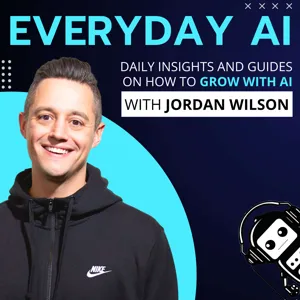Podcast Summary
The Role of a Prompt Engineer: Bridging the Gap Between User Input and AI Output.: Prompt engineers play a crucial role in ensuring AI-generated content meets user needs by providing essential context and preventing offensive outputs. This job exemplifies the growing employment opportunities in the AI industry.
The role of a prompt engineer is a crucial and relatively unknown job in the world of AI. Anna Bernstein, a prompt engineer at Copy.ai, explains that her job entails being the linguistic intermediary between user input and AI output. Her superpower is precision in language, enabling her to provide the necessary context and details that most people don't think to include in their prompts. The filter created by prompt engineers like Bernstein serves multiple purposes - to prevent the generation of offensive content and to help the AI understand the specific needs and intentions of users. This newly emerging job highlights how new technologies, like AI, create unique employment opportunities that were previously unimaginable.
The growing demand for prompt engineering and A.I. transformation in industries.: The job market for prompt engineers is thriving, showcasing how A.I. is creating new opportunities and revolutionizing various sectors. It is vital for individuals to adapt and discern relevant information in this A.I.-driven world.
Prompt engineering, a job that barely existed a few years ago, has become in-demand and highly valued in the field of A.I. Many industries are still grappling with whether and how they can benefit from prompt engineering and A.I. in general. However, the job market for prompt engineers is booming, with numerous high-paying opportunities available. This is just one example of how A.I. is creating new jobs and transforming various sectors. Additionally, the widespread adoption of A.I. in the future will bring about significant changes in our personal and professional lives. It is crucial for individuals to adapt and embrace these changes, as A.I. becomes an integral part of our daily lives. Ultimately, the key to navigating this A.I.-driven world lies not only in acquiring knowledge but also in developing the wisdom to discern which facts are truly relevant and meaningful.
The evolution of large language models (L.L.M.s) and the power of a small team: Large language models like GPT-4 and Bing are developed through a step-by-step process, starting with simple predictions. The work done by a small team can have a significant impact on groundbreaking technologies that reshape the world.
The development of large language models (L.L.M.s), such as GPT-4 and Bing, involves feeding vast amounts of text data to these models to train and improve their predictive capabilities. The process of building an L.L.M. starts off with simple steps, where the model looks at various documents and predicts the words that follow. Initially, these predictions are mostly random and inaccurate. However, with time and refining, L.L.M.s become more sophisticated and accurate in generating text. It is fascinating to learn that the original work on an L.L.M., like GPT-3, was accomplished by just three individuals. This signifies the significant impact that a small team can have in shaping groundbreaking technologies that eventually reshape the world.
Evolution of Language Models: From Basic Spelling to Coherent Sentences: Language models, like children, undergo a learning process to understand language and concepts. They progress from basic spelling to forming coherent sentences, constantly improving their accuracy over time.
Language models, similar to newborn babies, go through a learning process to understand the world around them. Initially, they grasp the basic spelling of words and gradually learn grammar. However, even with correct sentence structure, the meaning may still be nonsensical. As the model progresses, it starts to form coherent sentences, gaining a better understanding of language and concepts. The learning curve of language models resembles that of children, with different stages of comprehension. These models, like children, acquire knowledge over time and undergo continuous training to improve their accuracy. While the models possess vast amounts of information, it is comparable to a child's expanding understanding, where one can assess specific aspects of knowledge but not grasp everything they have learned.
Refining GPT-4: Shaping Language Models to Align with Human Values: Developing large language models like GPT-4 involves extensive human intervention to ensure the model's behavior aligns with human values and standards, although achieving perfection remains challenging.
Developing and refining large language models, such as GPT-4, requires extensive human intervention even after the initial training and math are completed. While the process of building the original model is a significant undertaking, the real challenge lies in shaping the model's behavior and ensuring it aligns with human values and standards. Companies like OpenAI and Anthropic use methods such as "constitutional A.I." to establish explicit principles or a constitution that the model must adhere to. This approach involves training the model to follow the set principles and using another copy of the model to assess its actions against the constitution. By doing so, they aim to create models that respect human rights, avoid bias, and have clear guiding principles. However, achieving perfection in these models remains challenging, and ongoing improvement is necessary to align them with societal expectations.
Teaching A.I. the Importance of Ethical Decision-Making: By incorporating historical knowledge and a sense of respect for human rights, A.I. systems can make informed ethical decisions, creating a constitutional A.I. that distinguishes right from wrong and unlocks its potential to solve complex problems.
A.I. systems should be taught to understand and differentiate between right and wrong. Just like humans, models should learn from history, including the good and bad parts, to develop a sense of respect for human rights. By incorporating knowledge of past mistakes and atrocities, A.I. can become more empathetic and make informed ethical decisions. The concept of creating a constitutional A.I., proposed by Amodei, aims to address this challenge and help A.I. systems distinguish right from wrong. While there have been hurdles in teaching A.I. morality, there is cautious optimism that advancements like Claude's constitution can overcome them. Moreover, A.I. holds tremendous potential in solving complex problems, particularly in the field of biophysics, such as curing diseases like cancer. Although there are concerns about the downsides of A.I., it is seen as a technology that can propel scientific progress and achieve breakthroughs that have eluded humans.
The Threat of AI in the Development of Biological Weapons: It is important to prioritize beneficial AI applications and regulate its use to prevent misuse, with industry leaders and government collaborating to ensure responsible use of AI technology.
The development of biological weapons through artificial intelligence (A.I.) is a genuine concern. It is worrisome to think about the possibility of A.I. placing such destructive tools in the hands of terrorists and psychopaths. While there are barriers in place that prevent individuals with bad intentions from accessing knowledge and resources, A.I. has the potential to lower these barriers. As A.I. technology advances, there is a need to consider how to prioritize the development of beneficial applications while preventing the misuse of A.I. tools. Both self-regulation by industry leaders and government intervention are crucial in this process. Companies like Frontier Model Forum have taken the initiative to form oversight groups, and the government must play a watchdog role while collaborating with businesses and nonprofit organizations. The regulation of A.I. is an ongoing issue, but it is essential to acknowledge that A.I. is already present and cannot be stopped.
Effective Communication with AI: Balancing Precision and Context: Communicating effectively with AI requires clear instructions while also understanding the importance of context and shared understanding, similar to interacting with a stranger.
Effectively communicating with AI requires us to consider how we communicate with human beings. AI, like any new technology, will have winners and losers, and understanding how to work with AI can lead to new opportunities. Anna Bernstein's experience in copywriting for large language model AI reveals the importance of context in human communication. The models are trained to follow precise instructions, but they also need to excel in fuzzy communication with people. This means that the way we talk to one another, relying on context cues and shared understanding, is crucial when communicating with AI. It highlights the need for clear and precise instructions while also recognizing the nuances of communication. Just like interacting with a stranger, it takes time and consideration to effectively engage with AI.
Enhancing A.I. Results Through Clear and Contextual Prompts: To optimize A.I. tools, provide clear and specific prompts with context. Utilize synonyms, varied syntax, and related words to unlock the A.I.'s capabilities. Reflect on desired outcomes to ensure proper thinking and articulation.
In order to get better results from A.I. tools, it is important to provide clear and specific prompts with enough context. The speaker, Anna Bernstein, emphasizes the power of well-crafted prompts that accurately describe what you want from the A.I. When prompts are too generic, the A.I. may provide dull and middle-of-the-road responses. To improve A.I. results, it is essential to be more specific and provide additional details or context. Bernstein suggests using synonyms, different syntax, and piling on related words to unlock the capabilities of the A.I. Furthermore, the conversation highlights the importance of self-reflection and clarity on what you truly want from the A.I., as sometimes the problem may lie in the lack of proper thinking and articulation of desired outcomes.
Enhancing Communication and Engagement with AI: When writing with AI, use powerful verbs, provide context, speak naturally, and encourage the AI to ask questions. Summarize tasks and address confusions for effective communication. Learn to effectively communicate with AI.
When it comes to writing, using powerful verbs and providing ample context can make a significant difference. In order to create an engaging and exploratory piece, it is important to go beyond regurgitating facts and instead focus on conveying the purpose and essence of the topic. Avoiding negativity and speaking in a normal language format works effectively with AI, as it allows for a more natural and human-like interaction. To enhance communication, one can encourage the AI to ask questions that aid in understanding the needs and objectives. Additionally, instructing the AI to summarize the task and address any confusions before taking action can be beneficial. Though the process can be both enjoyable and frustrating, it offers an opportunity to learn how to effectively communicate with AI.
A.I. as a Valuable Tool for Entrepreneurs: Embracing A.I. as a partner can significantly enhance an entrepreneur's journey, providing valuable advice, support, and the potential for increased success in pursuing their dreams.
A.I. is proving to be a useful tool for entrepreneurs, providing them with valuable advice and encouragement. Ethan Mollick, a professor of management, highlights the potential of A.I. in helping would-be entrepreneurs pursue their dreams. By utilizing A.I. tools, entrepreneurs can receive guidance and support from a virtual partner, ultimately making a significant difference in their lives. A.I. serves as a general-purpose technology, capable of providing suggestions and pushing individuals past their limits. While A.I. is still in its early stages and most applications are mundane, its potential lies in its ability to assist and collaborate with individuals, resembling a trusted co-founder. So, for aspiring entrepreneurs, embracing A.I. as a partner can lead to increased success and a more fulfilling entrepreneurial journey.
Using AI as an "Entrepreneurship Engine" to Overcome Barriers and Start a Business: AI, such as GPT-4, offers reasonable guidance, conducts initial tests, and helps explore idea viability. It can be an invaluable tool in navigating the process of starting a business.
One major barrier to success in starting a business is giving up too soon. Many people abandon their ideas before even taking any action, while others stop when they face obstacles along the way. Ethan Mollick emphasizes that the use of AI, particularly advanced models like GPT-4, can be immensely helpful in overcoming this inertia. Although AI may not provide the absolute best steps or be flawless, it offers reasonable guidance and assists in conducting initial tests and experiments. Mollick even recommends interviewing AI as a potential customer to explore the viability of ideas. By utilizing AI as an "entrepreneurship engine," individuals can better navigate the process of starting a small business and bring their fantasies to life.
Enhancing ideation through AI: Connecting ideas and generating creative solutions step by step.: Interact with AI by providing detailed context and prompts, embracing experimentation, leading to better outcomes in generating creative solutions.
A.I. excels at combining and finding connections between ideas, making it a valuable tool for generating creative solutions. By providing the A.I. with specific prompts and context, such as the target audience and desired goals, it can generate a multitude of ideas and variations. Interacting with the A.I. and asking for further development of specific ideas enhances the ideation process. However, it's important to be cautious and knowledgeable in the subject matter, as the A.I. may occasionally provide inaccurate information. The more you interact with the A.I. and provide it with detailed context, the better the outcomes will be. Embracing experimentation and adjusting prompts will lead to more effective results.
Unlocking Innovation Through Constrained Ideation: Embracing constraints in brainstorming sessions can lead to unexpected and innovative ideas, challenging traditional thinking and fostering creative problem-solving. AI tools can further enhance this process.
Constrained ideation can be a highly effective tool for generating new and innovative ideas. By placing constraints on their brainstorming session, such as focusing on stationery ideas or incorporating different themes, the speakers were able to explore a wide range of possibilities. Even though some ideas may seem silly or impractical at first, they can spark connections and open up new avenues of thinking. The process is made even easier and faster with the help of AI tools. The speakers discovered that by embracing constraints and allowing their minds to wander, they could uncover unexpected ideas and potential business ventures. This highlights the importance of thinking creatively and approaching problem-solving from different angles.
Activating the Power of A.I. for Creative Expansion: A.I. can be a valuable tool to stimulate creativity, expand possibilities, and enhance education if used actively and thoughtfully.
Using artificial intelligence (A.I.) as a thought partner can be a very active and effective process. It is not about simply relying on A.I. to do all the thinking work or cheating by using it to complete tasks for us. Instead, A.I. can be used to push us forward, stimulate creative ideas, and help us clarify our own thoughts. This approach allows us to expand the range of human possibilities and achieve things that were previously not possible. Furthermore, A.I. can also have a positive impact on education, helping students learn, test their knowledge, and increase future recall. While the future of A.I. is uncertain, it is clear that it has the potential to be incredibly exciting and transformative if applied thoughtfully and actively.
The Potential and Challenges of A.I. in Our Lives: A.I. is a powerful tool that can transform industries and jobs, but its future impact hinges on how humans embrace and regulate it. It has the potential to enhance our lives by helping us convey deep emotions.
The current state of A.I. is not as advanced as the hype suggests. It is a powerful tool that demands our attention, but it is still far from being fully developed. The future of our lives with A.I. is not predetermined – it will ultimately depend on how we as humans utilize and regulate it. A.I. will undoubtedly transform industries and jobs, bringing both benefits and drawbacks. Therefore, it is crucial to embrace and understand A.I., regardless of our personal feelings towards it. An anecdote about an elderly man using A.I. to express his love for his dying wife illustrates the potential of this technology to enhance and enrich our lives by helping us convey our deepest emotions when words fail us.




